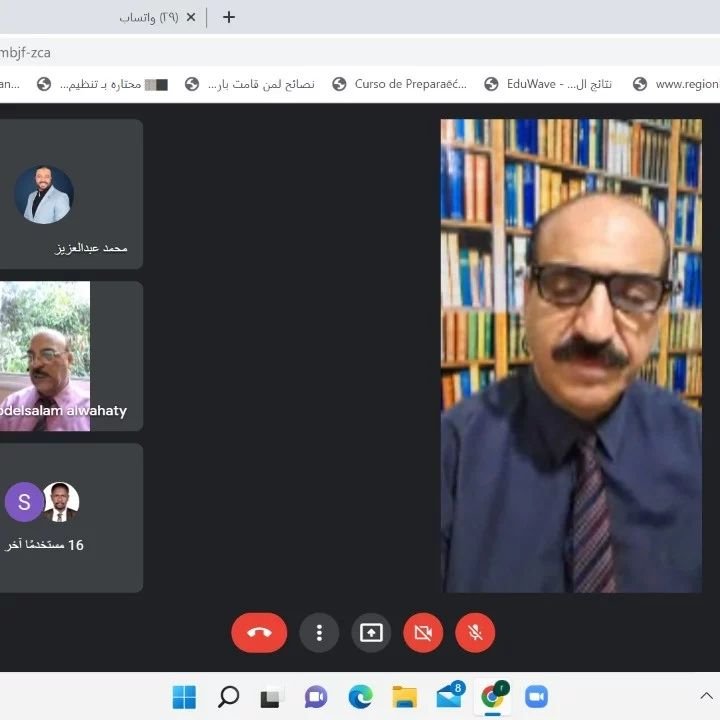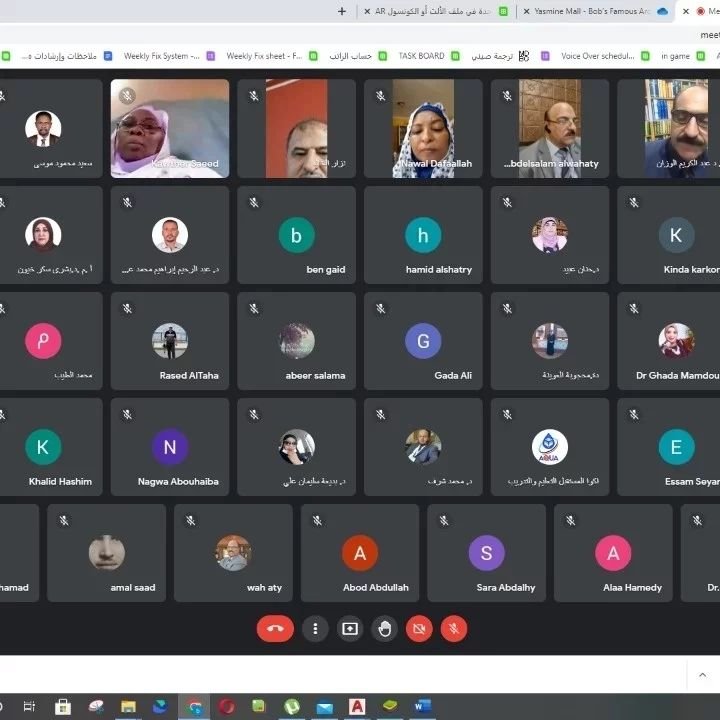Launch of the activities of the international conference “New Media and its Role in Enhancing Social Security”
The Union of Afro-Asia Universities launched its scientific conference yesterday titled “New Media and Its Role in Enhancing Social Security and Economic Development” on the virtual platform in cooperation with Mohammed V University in Rabat, the Union of Arab Women Leaders, and Aqua Group for Technology and Education. Dr. Magda Mahmoud, Chief Correspondent of Egyptian Television and head of the conference’s media committee, opened the event by welcoming participants on this distinguished day in the Union’s history. She emphasized the importance of direct and active contributions in all fields aimed at advancing the level of science nationally and globally, addressing the needs of researchers, and supporting competition to develop and enhance competitiveness. She stressed the need to diversify scientific research across the Arab, African, and Asian regions, moving away from total reliance on others and working to advance the knowledge and scientific level of academic partnerships to achieve scientific and social progress. She highlighted the importance of good practices in managing scientific research to ensure keeping pace with scientific developments and modern technological methods, enabling partners to increase scientific research and improve quality and competitiveness in a smooth scientific and social dialogue.
The conference’s Secretary-General, Dr. Abdul Kareem Al-Wazan, praised the efforts of researchers who submitted rigorous studies contributing to diagnosing reality, addressing challenges, and offering solutions to complex issues in the region. Al-Wazan also commended the efforts of the various conference committees, acknowledging the media committee as one of the key pillars of the conference’s success.
In his speech on behalf of the researchers, Dr. Amin Mansour Wafi, Professor of Media and Communication Technology at the Islamic University of Palestine, stated that the scientific conference is an important opportunity to meet dozens of academics in a distinguished research forum to present their research findings in support of the knowledge process in the region.
The scientific sessions of the first day began with the first session chaired by Dr. Tariq Al-Mirghani and moderated by Dr. Magda Mahmoud. Dr. Al-Mirghani praised the efforts of the researchers, who then began presenting their studies. Researcher Sara Kmeikh, a member of Kuwait University’s Higher Advisory Committee for Teacher Preparation and the Cultural and Educational Exchange Committee between Kuwait and Australia, presented her research titled “Digital Media and the Management of Social Crises.” She considered the media throughout history a key factor in addressing social and cultural issues, distinguished by its speed in spreading information. Kmeikh noted that her study aims to highlight several results, including the role of social media in containing crises and the significance of media awareness as an educational study for students to understand the media message.
Professor Hanan Obeid, Deputy Editor-in-Chief and Senior Advisory Board Member of London Research Journal, and a member of the editorial board of the Journal of Human Sciences in Algeria, presented her research titled “The Reality of New Media Responsibility and Its Role in Promoting Social Security Among Students of Jordanian Public Universities.” She emphasized the pivotal and fundamental role of the media as a platform for social security through broadcasting positive messages that promote peace and security, ultimately achieving economic development.
Professor Insaf Ayyoub Al-Momani, an Associate Professor at the College of Media at the University of Minnesota, USA, presented her study titled “The Role of Media in Addressing the Challenges Facing Jordanian Women, Submitted to the Conference on Contemporary Women’s Issues: Reality, Challenges, and Future Prospects.” The study aimed to identify the key challenges facing Jordanian women and the functional tools employed by the media to address them. Among the prominent challenges facing Jordanian women is media openness, which casts negative shadows on their emotional, psychological, and economic aspects, including the dominant culture of image, marital infidelity, and the prominence of media stars despite weak content. The study recommended bringing women’s issues to the heart of the media space, harnessing women’s creative energies, and placing the right woman in the right place, as well as establishing a media charter to limit media chaos and overflow.
Researcher Dr. Abdul Salam Said Mohammed Al-Wahati, Vice Dean of the College of Media at the University of Minnesota, USA, and Editor-in-Chief of several Egyptian and Arab newspapers and websites, presented a paper titled “The Relationship Between Egyptian University Students’ Use of Social Media and Their Promotion of Values of Tolerance,” a descriptive study that concluded that students’ use of social media is high and should be invested in to promote tolerance due to the low level of dialogue and discussion among students.
Professor Amin Mansour Wafi, Professor of Media and Communication Technology at the Islamic University of Gaza, presented his research paper titled “The Media Image of the Martyr Journalist Shireen Abu Akleh on International Satellite Channels Broadcasting in Arabic – A Comparative Analytical Study.” The study aimed to explore the dimensions and components of Shireen Abu Akleh’s image on the websites of international satellite channels broadcasting in Arabic, examining the characteristics of that image and what the websites convey about her. The study recommended that foreign satellite channels maintain objectivity and professionalism when addressing the Palestinian issue, focusing on both positive and negative aspects of personalities rather than just the negative.
At the end of the session, which lasted about two hours, Dr. Al-Mirghani summarized and concluded the research presentations, and the session ended with a set of recommendations.
Second Session
The second session began under the chairmanship of Dr. Abdul Kareem Al-Wazan, with Dr. Najwa Abu Heba, a professor of law at the College of Law, Abu Dhabi University, UAE, and a professor at the Faculty of Law at Helwan University, serving as rapporteur. Dr. Al-Wazan praised the researchers’ efforts, and the session began with Dr. Jihan Sibaq, an Assistant Professor at the College of Communication and Humanities, Department of Media and Public Relations, University of Minnesota, USA, presenting her joint study with Dr. Firoz Abdul Hamid Jabir, an Assistant Professor at the College of Media and Communication Arts, University of Minnesota, USA. Their study, “The Impact of New Media on Married Women’s Participation in Citizen Journalism on Electronic Platforms,” focused on married women or housewives as essential pillars of family structure and social composition, examining their participation in such platforms as part of citizen journalism, and the impact of that on the Arab family. The study found a positive correlation between the degree of women’s interaction with citizen journalism platforms and the benefit to the family.
Dr. Mohammad Khaled Al-Zoubi, a researcher in educational affairs at the Jordanian Ministry of Education, presented his study titled “Digital Media and Its Impact on Intellectual Security (Social Media as a Model).” The study, which followed a descriptive and inductive approach, concluded that social media is an alternative and more effective medium than traditional media, playing a crucial role in shaping awareness and public opinion. However, the lack of clarity and the chaotic nature of digital media were seen as significant challenges.
Dr. Mohammad Sharaf Mohammad Hashim, Assistant Professor in the Department of Media at the Islamic University of Minnesota, USA, and a visiting faculty member at Kuwait University, presented his research titled “The Role of Social Media Programs in Influencing Muslim Youth Values and Principles,” which sought to understand the impact of social media on values and principles.
In a joint study by Dr. Sabah Mahdi Rumaydh, Professor at the University of Baghdad, and Dr. Falah Khalaf Kazem, Professor at Al-Mustansiriya University, they explored the impact of media discourse on the culture of peace and coexistence in Iraq.
In closing, Dr. Mohammad Abdul Aziz, the conference’s spokesperson, praised the efforts of the session chairs and rapporteurs, highlighting the importance of the research presented.









